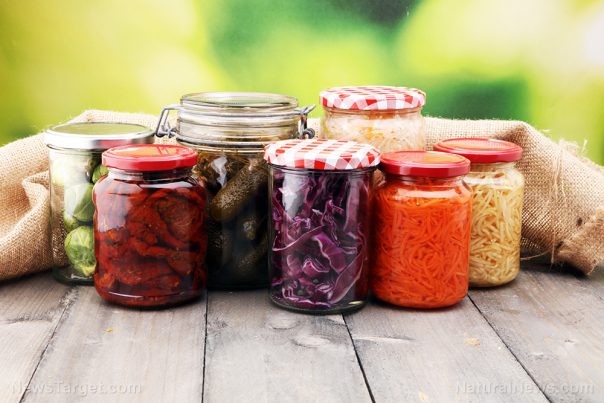Prepper hacks: 20 Tips for surviving the next chaotic situation with ease
Monday, May 27, 2019 by Zoey Sky
http://www.bugout.news/2019-05-27-20-tips-for-surviving-the-next-chaotic-situation-with-ease.html

Life hacks aren’t just for everyday use. The prepping hacks below can be incredibly useful, and some of them can even help you save money in a post-SHTF world. (h/t to TheOrganicPrepper.com)
Carry packets of white sugar.
Keep sugar packets, such as those in fast food restaurants, in your everyday carry kits (EDC kits). If you get injured, pour white sugar onto the wound to keep it clean and promote faster healing.
This unusual treatment works because sugar draws water out of the wound, which starves bacteria and stops its growth and proliferation.
Fill your canning jars.
Don’t store empty Mason jars on your shelves. Jars take up the same amount of space whether they’re full or empty, and you might as well use them for storage while you don’t need them for canning. (Related: Old-school life hacks that are still relevant today.)
Get some vitamin D every day (even in winter).
Sunlight synthesizes vitamin D in the body, and the vitamin helps strengthen bones and teeth. This can keep your strength up even after disaster strikes.
Keep your skin moisturized.
This tip isn’t just about looking nice when disaster strikes. Your skin is a barrier that prevents infection and keeping it supple prevents cracking, which can make you susceptible to infectious diseases.
Keep an eye out for carbon monoxide.
Make sure your house is properly ventilated when burning fossil fuels during a power outage, especially in winter. Having adequate ventilation and installing carbon monoxide (CO) detectors will prevent CO poisoning.
Keep your freezer cool (even if the power runs out) with water bottles.
Fill empty drinking water bottles with water then freeze them. You can also use the frozen bottles as coolers in packed lunches and picnic baskets.
Learn how to make petroleum jelly firestarter balls.
To make these DIY firestarters, dip cotton balls in petroleum jelly.
Petroleum jelly firestarter balls burn hotter and longer than typical paper. Store the cotton balls in airtight plastic pill bottles to keep the moisture in.
Learn how to use your hunting knife.
Don’t let your hunting knife go to waste in your bug-out bag (BOB). Practice using your hunting knife in the kitchen to prepare food.
Learning how to use your prepping tools before a survival scenario can prevent serious injuries.
Make sure everyone finishes their household chores.
Give family members their own chores. If you have small children, make sure they at least know how to put away their toys. Doing chores for about 30 minutes every day will save you some time, compared to tidying up only once a week.
Practice portion control.
Practice portion control to prepare everyone for smaller meals should you need to stretch out your food supplies. Use smaller plates and tell your family to ask for seconds if they’re still hungry.
Prepare BOBs for the whole family.
Don’t wait until it’s too late to prepare BOBs. Make sure it’s packed with enough gear, supplies, and clothing to help each family member survive for about 72 hours if you need to evacuate. Prepare a BOB for your pet, too.
Prepare for cold weather.
When winter rolls around, your neighborhood could lose power. Keep flashlights and extra batteries in various rooms in your house, and let everyone know where they’re stored.
Stock up on extra blankets and warm clothing so the whole family can stay warm when SHTF.
Recycle eggshells.
If you have slugs in your garden, crumble eggshells around plants to keep the slugs away. The eggshells will hurt the soft undersides of pesky slugs.
Alternatively, you can grind eggshells to make a fine calcium supplement that you can feed chickens.
Recycle old bed sheets.
Old bed sheets can be turned into different things, such as:
- Floor protectors
- Makeshift bandages
- Pet bedding
- Plant covers
- Sleeping bag liners
Recycle old bicycle tubes.
If you have old bicycle tires, save the inner tubes to make a recycled tourniquet. Wash it thoroughly before using.
Store bits of bicycle tubes in your firestarting kit. The material burns even when wet, making it the perfect firestarter.
Stay warm in “a room within a room” during winter power outages.
Set up a cheap pop-up tent in your apartment to stay warm during winter. The tent will be several degrees warmer inside compared to the room around it.
This is also ideal for houses without secondary heating.
Turn plastic bottles into plant waterers.
Get a large water bottle, then make two small slits in the cap. Fill the bottle with water, then place the bottle cap down in a hole between plants.
These DIY plant waterers will help plant roots stay moist.
Use Mylar or “space” blankets properly.
If someone is cold, don’t just give them a Mylar blanket. The silver surface prevents heat from reaching their body. To keep them warm, sit next to them then wrap the foil around both of you to retain body heat.
Wash your hands thoroughly.
Something as simple as proper hand washing will prevent infections in a post-SHTF world. Teach younger children the importance of hand washing.
If you run out of water, keep your hands clean with sanitary wipes or hand sanitizer.
Write your own reference book.
Get a folder and some dividers, then make a reference book for your neighborhood. Use this file to track useful information about your area. Include a map and think of safe shortcuts that the family can use if you need to bug out.
Find new uses for recycled items around your home and remember these prepper hacks to make things easier when SHTF.
Sources include:
Tagged Under: Tags: bug in, bug out, chaos, emergency, homesteading, how-to, life hacks, off grid, preparedness, prepper, prepping hacks, self-reliance, SHTF, survival, survival gear, Survival Tips, survivalist

